Analysis of UK Crude Oil Prices and Economic Determinants
VerifiedAdded on 2023/01/09
|11
|3631
|64
Report
AI Summary
This report provides a comprehensive analysis of the contemporary business environment in the context of the UK crude oil market from 2010 to 2020. It begins by examining the fluctuations in average crude oil prices during this period, highlighting significant changes and trends. The report then delves into the economic determinants influencing these price shifts, including demand and supply dynamics, taxation policies, and overall economic growth. Furthermore, it explores the impact of government actions, such as policies related to vehicle emissions and tax adjustments, on the UK market. Finally, the report analyzes and predicts the immediate and future effects of the COVID-19 pandemic on crude oil prices, considering factors like reduced demand and market disruptions. The analysis draws upon various sources to provide a well-rounded understanding of the complex interplay of factors shaping the UK crude oil market.

Contemporary
Business Environment
Business Environment
Paraphrase This Document
Need a fresh take? Get an instant paraphrase of this document with our AI Paraphraser
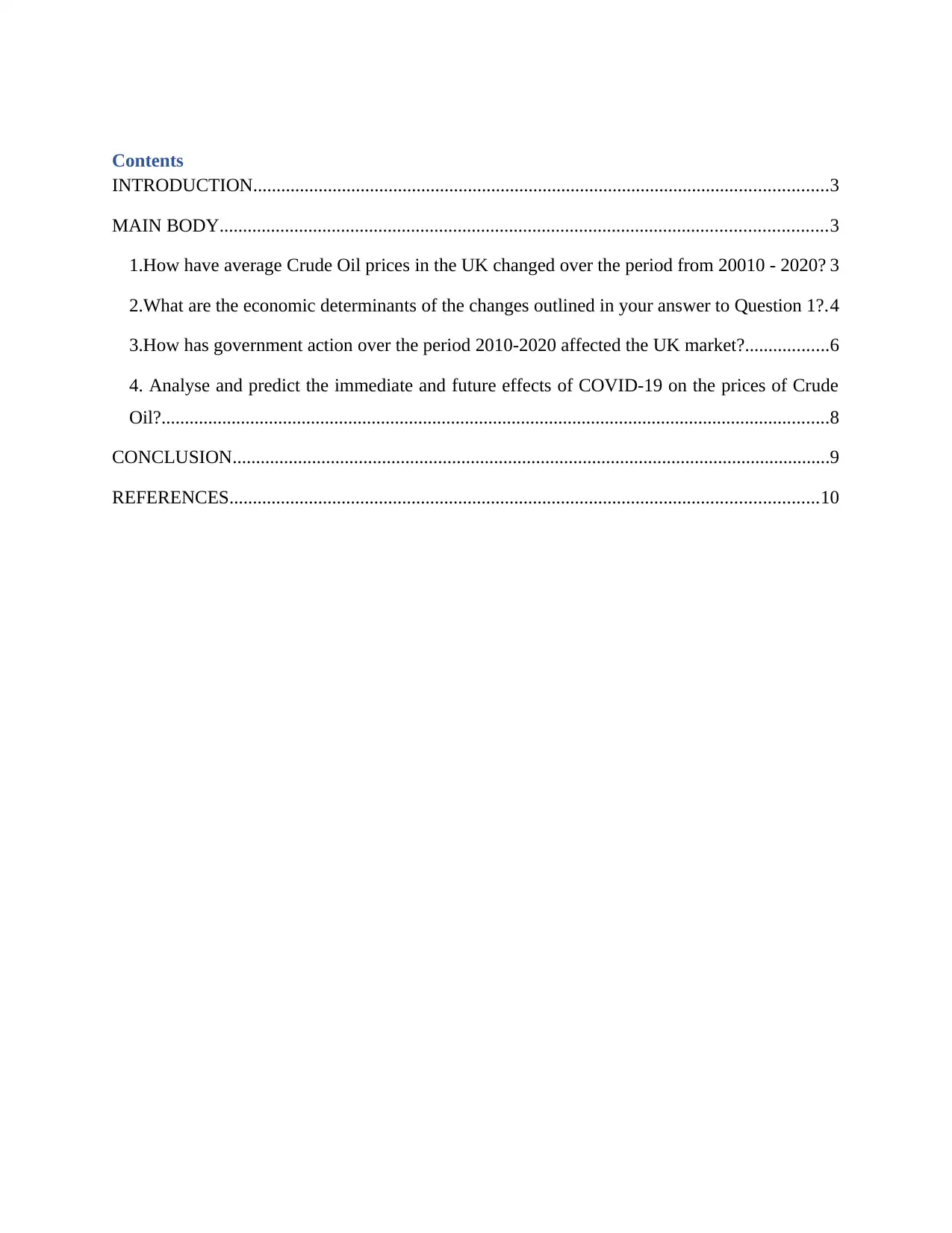
Contents
INTRODUCTION...........................................................................................................................3
MAIN BODY..................................................................................................................................3
1.How have average Crude Oil prices in the UK changed over the period from 20010 - 2020? 3
2.What are the economic determinants of the changes outlined in your answer to Question 1?.4
3.How has government action over the period 2010-2020 affected the UK market?..................6
4. Analyse and predict the immediate and future effects of COVID-19 on the prices of Crude
Oil?...............................................................................................................................................8
CONCLUSION................................................................................................................................9
REFERENCES..............................................................................................................................10
INTRODUCTION...........................................................................................................................3
MAIN BODY..................................................................................................................................3
1.How have average Crude Oil prices in the UK changed over the period from 20010 - 2020? 3
2.What are the economic determinants of the changes outlined in your answer to Question 1?.4
3.How has government action over the period 2010-2020 affected the UK market?..................6
4. Analyse and predict the immediate and future effects of COVID-19 on the prices of Crude
Oil?...............................................................................................................................................8
CONCLUSION................................................................................................................................9
REFERENCES..............................................................................................................................10
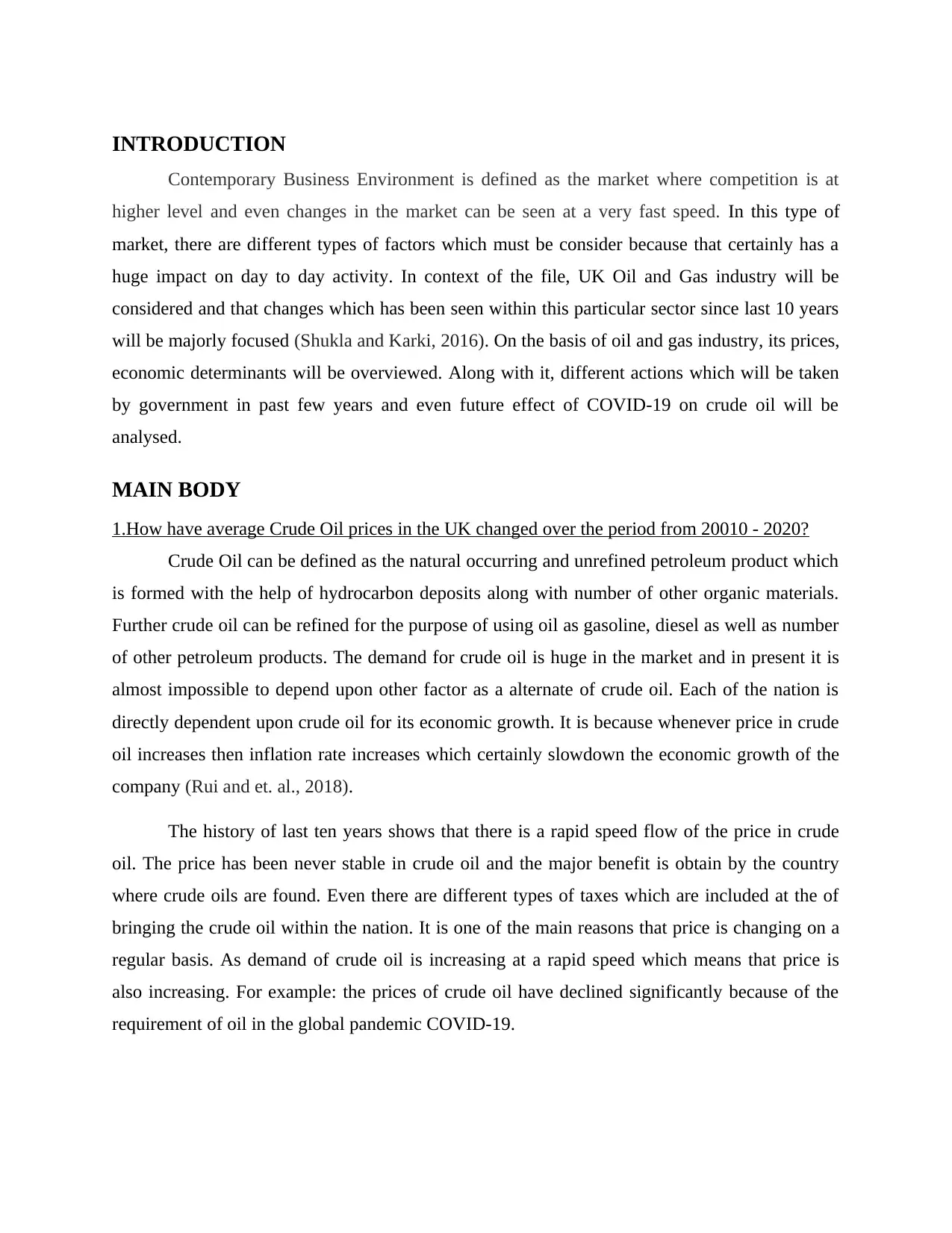
INTRODUCTION
Contemporary Business Environment is defined as the market where competition is at
higher level and even changes in the market can be seen at a very fast speed. In this type of
market, there are different types of factors which must be consider because that certainly has a
huge impact on day to day activity. In context of the file, UK Oil and Gas industry will be
considered and that changes which has been seen within this particular sector since last 10 years
will be majorly focused (Shukla and Karki, 2016). On the basis of oil and gas industry, its prices,
economic determinants will be overviewed. Along with it, different actions which will be taken
by government in past few years and even future effect of COVID-19 on crude oil will be
analysed.
MAIN BODY
1.How have average Crude Oil prices in the UK changed over the period from 20010 - 2020?
Crude Oil can be defined as the natural occurring and unrefined petroleum product which
is formed with the help of hydrocarbon deposits along with number of other organic materials.
Further crude oil can be refined for the purpose of using oil as gasoline, diesel as well as number
of other petroleum products. The demand for crude oil is huge in the market and in present it is
almost impossible to depend upon other factor as a alternate of crude oil. Each of the nation is
directly dependent upon crude oil for its economic growth. It is because whenever price in crude
oil increases then inflation rate increases which certainly slowdown the economic growth of the
company (Rui and et. al., 2018).
The history of last ten years shows that there is a rapid speed flow of the price in crude
oil. The price has been never stable in crude oil and the major benefit is obtain by the country
where crude oils are found. Even there are different types of taxes which are included at the of
bringing the crude oil within the nation. It is one of the main reasons that price is changing on a
regular basis. As demand of crude oil is increasing at a rapid speed which means that price is
also increasing. For example: the prices of crude oil have declined significantly because of the
requirement of oil in the global pandemic COVID-19.
Contemporary Business Environment is defined as the market where competition is at
higher level and even changes in the market can be seen at a very fast speed. In this type of
market, there are different types of factors which must be consider because that certainly has a
huge impact on day to day activity. In context of the file, UK Oil and Gas industry will be
considered and that changes which has been seen within this particular sector since last 10 years
will be majorly focused (Shukla and Karki, 2016). On the basis of oil and gas industry, its prices,
economic determinants will be overviewed. Along with it, different actions which will be taken
by government in past few years and even future effect of COVID-19 on crude oil will be
analysed.
MAIN BODY
1.How have average Crude Oil prices in the UK changed over the period from 20010 - 2020?
Crude Oil can be defined as the natural occurring and unrefined petroleum product which
is formed with the help of hydrocarbon deposits along with number of other organic materials.
Further crude oil can be refined for the purpose of using oil as gasoline, diesel as well as number
of other petroleum products. The demand for crude oil is huge in the market and in present it is
almost impossible to depend upon other factor as a alternate of crude oil. Each of the nation is
directly dependent upon crude oil for its economic growth. It is because whenever price in crude
oil increases then inflation rate increases which certainly slowdown the economic growth of the
company (Rui and et. al., 2018).
The history of last ten years shows that there is a rapid speed flow of the price in crude
oil. The price has been never stable in crude oil and the major benefit is obtain by the country
where crude oils are found. Even there are different types of taxes which are included at the of
bringing the crude oil within the nation. It is one of the main reasons that price is changing on a
regular basis. As demand of crude oil is increasing at a rapid speed which means that price is
also increasing. For example: the prices of crude oil have declined significantly because of the
requirement of oil in the global pandemic COVID-19.
⊘ This is a preview!⊘
Do you want full access?
Subscribe today to unlock all pages.

Trusted by 1+ million students worldwide
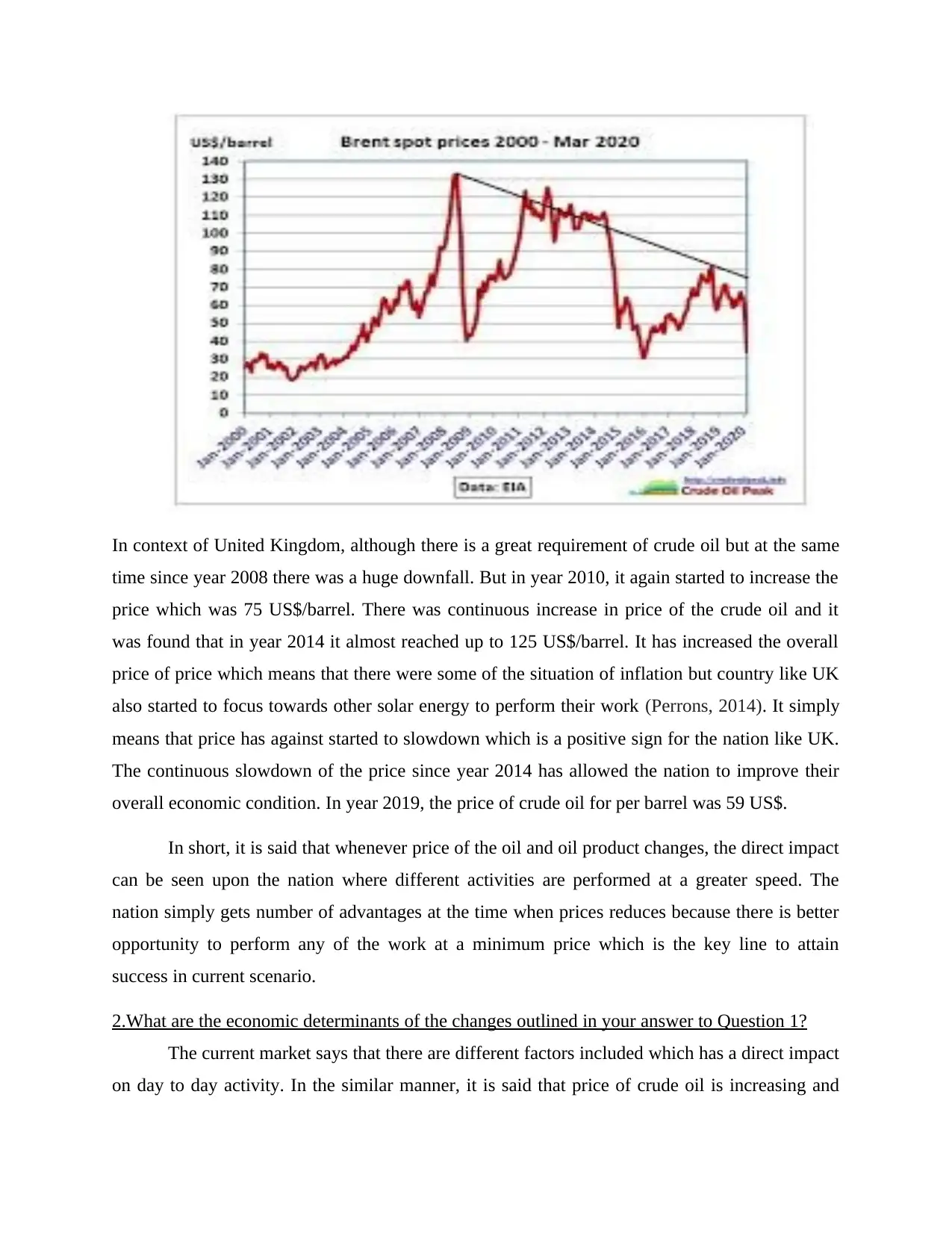
In context of United Kingdom, although there is a great requirement of crude oil but at the same
time since year 2008 there was a huge downfall. But in year 2010, it again started to increase the
price which was 75 US$/barrel. There was continuous increase in price of the crude oil and it
was found that in year 2014 it almost reached up to 125 US$/barrel. It has increased the overall
price of price which means that there were some of the situation of inflation but country like UK
also started to focus towards other solar energy to perform their work (Perrons, 2014). It simply
means that price has against started to slowdown which is a positive sign for the nation like UK.
The continuous slowdown of the price since year 2014 has allowed the nation to improve their
overall economic condition. In year 2019, the price of crude oil for per barrel was 59 US$.
In short, it is said that whenever price of the oil and oil product changes, the direct impact
can be seen upon the nation where different activities are performed at a greater speed. The
nation simply gets number of advantages at the time when prices reduces because there is better
opportunity to perform any of the work at a minimum price which is the key line to attain
success in current scenario.
2.What are the economic determinants of the changes outlined in your answer to Question 1?
The current market says that there are different factors included which has a direct impact
on day to day activity. In the similar manner, it is said that price of crude oil is increasing and
time since year 2008 there was a huge downfall. But in year 2010, it again started to increase the
price which was 75 US$/barrel. There was continuous increase in price of the crude oil and it
was found that in year 2014 it almost reached up to 125 US$/barrel. It has increased the overall
price of price which means that there were some of the situation of inflation but country like UK
also started to focus towards other solar energy to perform their work (Perrons, 2014). It simply
means that price has against started to slowdown which is a positive sign for the nation like UK.
The continuous slowdown of the price since year 2014 has allowed the nation to improve their
overall economic condition. In year 2019, the price of crude oil for per barrel was 59 US$.
In short, it is said that whenever price of the oil and oil product changes, the direct impact
can be seen upon the nation where different activities are performed at a greater speed. The
nation simply gets number of advantages at the time when prices reduces because there is better
opportunity to perform any of the work at a minimum price which is the key line to attain
success in current scenario.
2.What are the economic determinants of the changes outlined in your answer to Question 1?
The current market says that there are different factors included which has a direct impact
on day to day activity. In the similar manner, it is said that price of crude oil is increasing and
Paraphrase This Document
Need a fresh take? Get an instant paraphrase of this document with our AI Paraphraser
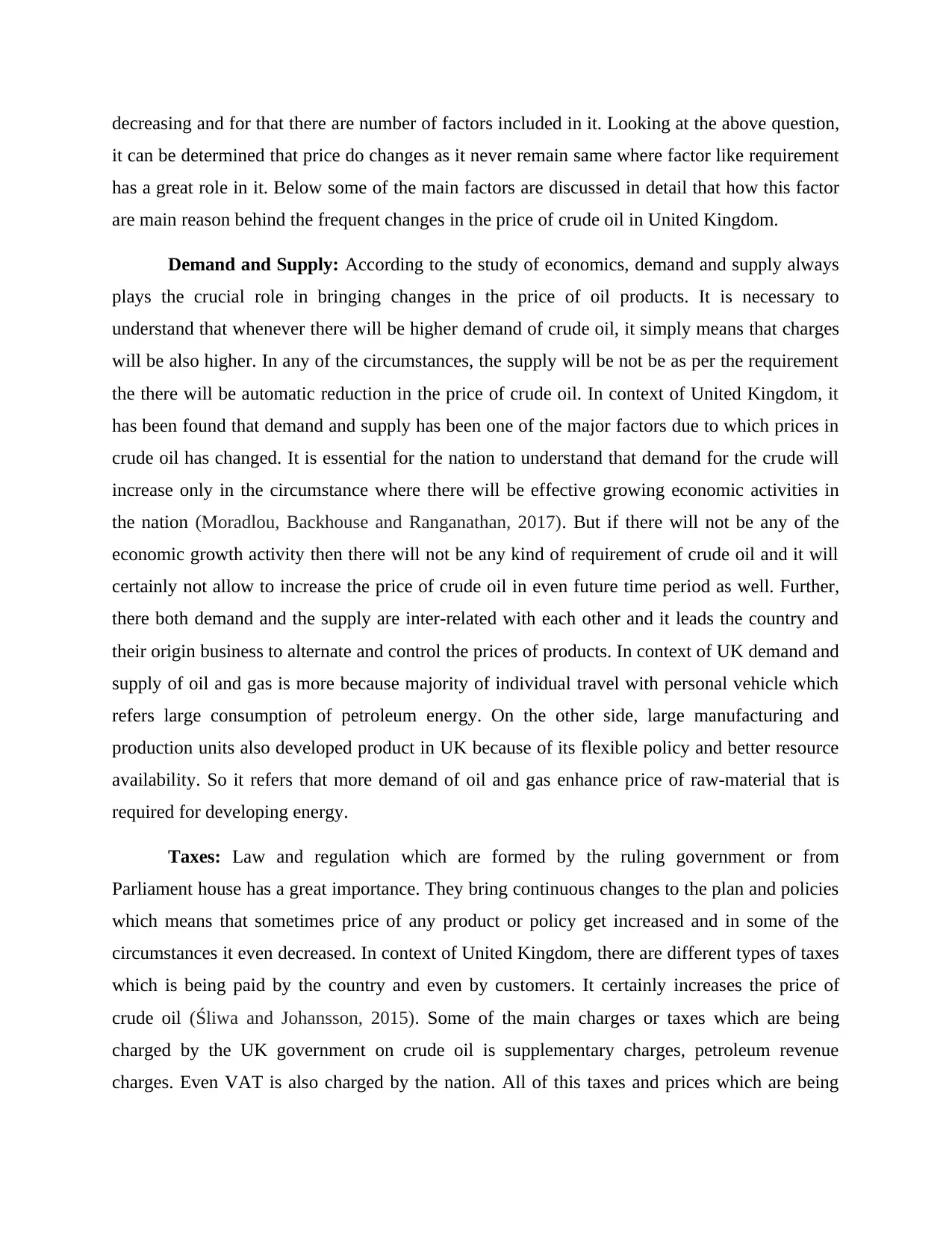
decreasing and for that there are number of factors included in it. Looking at the above question,
it can be determined that price do changes as it never remain same where factor like requirement
has a great role in it. Below some of the main factors are discussed in detail that how this factor
are main reason behind the frequent changes in the price of crude oil in United Kingdom.
Demand and Supply: According to the study of economics, demand and supply always
plays the crucial role in bringing changes in the price of oil products. It is necessary to
understand that whenever there will be higher demand of crude oil, it simply means that charges
will be also higher. In any of the circumstances, the supply will be not be as per the requirement
the there will be automatic reduction in the price of crude oil. In context of United Kingdom, it
has been found that demand and supply has been one of the major factors due to which prices in
crude oil has changed. It is essential for the nation to understand that demand for the crude will
increase only in the circumstance where there will be effective growing economic activities in
the nation (Moradlou, Backhouse and Ranganathan, 2017). But if there will not be any of the
economic growth activity then there will not be any kind of requirement of crude oil and it will
certainly not allow to increase the price of crude oil in even future time period as well. Further,
there both demand and the supply are inter-related with each other and it leads the country and
their origin business to alternate and control the prices of products. In context of UK demand and
supply of oil and gas is more because majority of individual travel with personal vehicle which
refers large consumption of petroleum energy. On the other side, large manufacturing and
production units also developed product in UK because of its flexible policy and better resource
availability. So it refers that more demand of oil and gas enhance price of raw-material that is
required for developing energy.
Taxes: Law and regulation which are formed by the ruling government or from
Parliament house has a great importance. They bring continuous changes to the plan and policies
which means that sometimes price of any product or policy get increased and in some of the
circumstances it even decreased. In context of United Kingdom, there are different types of taxes
which is being paid by the country and even by customers. It certainly increases the price of
crude oil (Śliwa and Johansson, 2015). Some of the main charges or taxes which are being
charged by the UK government on crude oil is supplementary charges, petroleum revenue
charges. Even VAT is also charged by the nation. All of this taxes and prices which are being
it can be determined that price do changes as it never remain same where factor like requirement
has a great role in it. Below some of the main factors are discussed in detail that how this factor
are main reason behind the frequent changes in the price of crude oil in United Kingdom.
Demand and Supply: According to the study of economics, demand and supply always
plays the crucial role in bringing changes in the price of oil products. It is necessary to
understand that whenever there will be higher demand of crude oil, it simply means that charges
will be also higher. In any of the circumstances, the supply will be not be as per the requirement
the there will be automatic reduction in the price of crude oil. In context of United Kingdom, it
has been found that demand and supply has been one of the major factors due to which prices in
crude oil has changed. It is essential for the nation to understand that demand for the crude will
increase only in the circumstance where there will be effective growing economic activities in
the nation (Moradlou, Backhouse and Ranganathan, 2017). But if there will not be any of the
economic growth activity then there will not be any kind of requirement of crude oil and it will
certainly not allow to increase the price of crude oil in even future time period as well. Further,
there both demand and the supply are inter-related with each other and it leads the country and
their origin business to alternate and control the prices of products. In context of UK demand and
supply of oil and gas is more because majority of individual travel with personal vehicle which
refers large consumption of petroleum energy. On the other side, large manufacturing and
production units also developed product in UK because of its flexible policy and better resource
availability. So it refers that more demand of oil and gas enhance price of raw-material that is
required for developing energy.
Taxes: Law and regulation which are formed by the ruling government or from
Parliament house has a great importance. They bring continuous changes to the plan and policies
which means that sometimes price of any product or policy get increased and in some of the
circumstances it even decreased. In context of United Kingdom, there are different types of taxes
which is being paid by the country and even by customers. It certainly increases the price of
crude oil (Śliwa and Johansson, 2015). Some of the main charges or taxes which are being
charged by the UK government on crude oil is supplementary charges, petroleum revenue
charges. Even VAT is also charged by the nation. All of this taxes and prices which are being
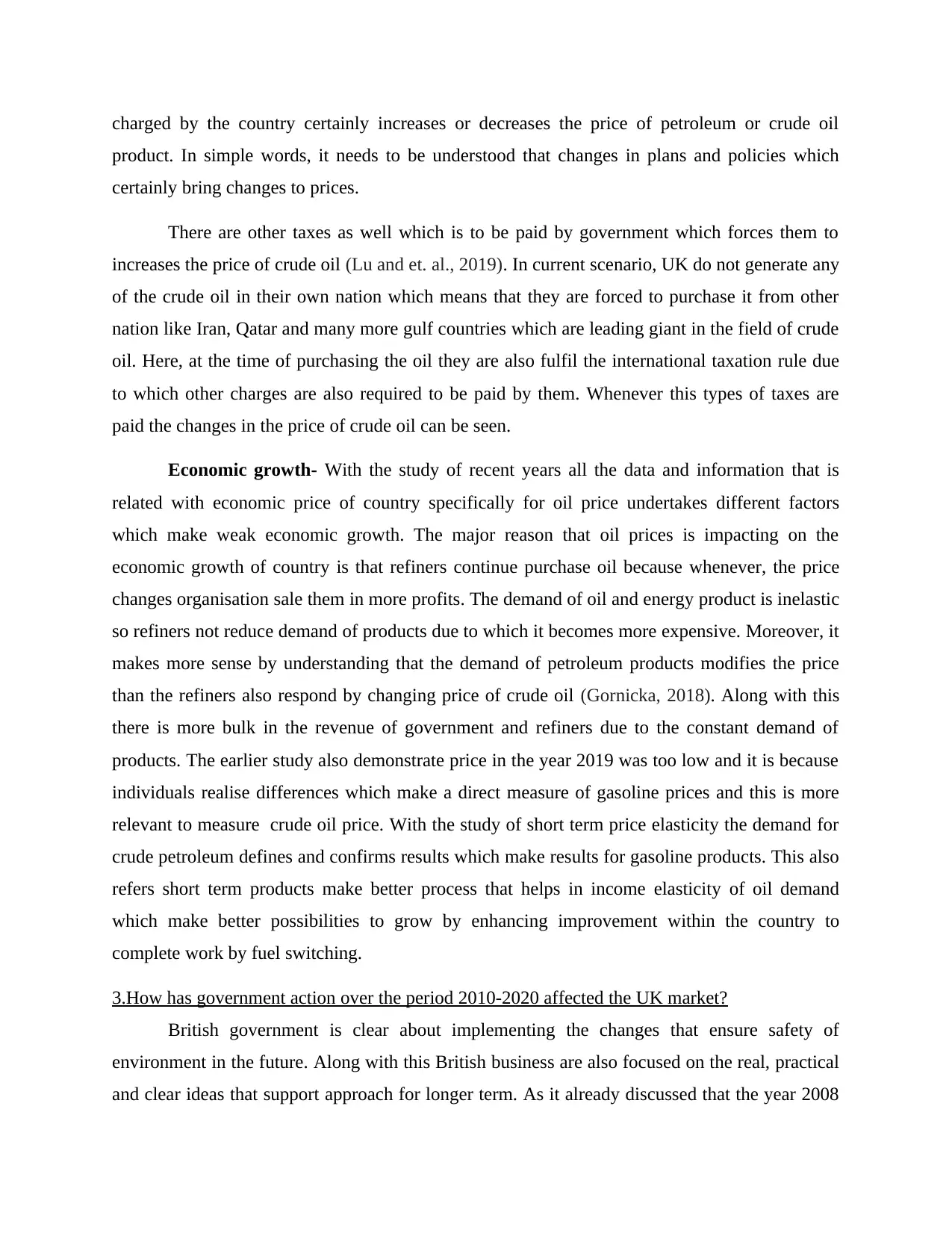
charged by the country certainly increases or decreases the price of petroleum or crude oil
product. In simple words, it needs to be understood that changes in plans and policies which
certainly bring changes to prices.
There are other taxes as well which is to be paid by government which forces them to
increases the price of crude oil (Lu and et. al., 2019). In current scenario, UK do not generate any
of the crude oil in their own nation which means that they are forced to purchase it from other
nation like Iran, Qatar and many more gulf countries which are leading giant in the field of crude
oil. Here, at the time of purchasing the oil they are also fulfil the international taxation rule due
to which other charges are also required to be paid by them. Whenever this types of taxes are
paid the changes in the price of crude oil can be seen.
Economic growth- With the study of recent years all the data and information that is
related with economic price of country specifically for oil price undertakes different factors
which make weak economic growth. The major reason that oil prices is impacting on the
economic growth of country is that refiners continue purchase oil because whenever, the price
changes organisation sale them in more profits. The demand of oil and energy product is inelastic
so refiners not reduce demand of products due to which it becomes more expensive. Moreover, it
makes more sense by understanding that the demand of petroleum products modifies the price
than the refiners also respond by changing price of crude oil (Gornicka, 2018). Along with this
there is more bulk in the revenue of government and refiners due to the constant demand of
products. The earlier study also demonstrate price in the year 2019 was too low and it is because
individuals realise differences which make a direct measure of gasoline prices and this is more
relevant to measure crude oil price. With the study of short term price elasticity the demand for
crude petroleum defines and confirms results which make results for gasoline products. This also
refers short term products make better process that helps in income elasticity of oil demand
which make better possibilities to grow by enhancing improvement within the country to
complete work by fuel switching.
3.How has government action over the period 2010-2020 affected the UK market?
British government is clear about implementing the changes that ensure safety of
environment in the future. Along with this British business are also focused on the real, practical
and clear ideas that support approach for longer term. As it already discussed that the year 2008
product. In simple words, it needs to be understood that changes in plans and policies which
certainly bring changes to prices.
There are other taxes as well which is to be paid by government which forces them to
increases the price of crude oil (Lu and et. al., 2019). In current scenario, UK do not generate any
of the crude oil in their own nation which means that they are forced to purchase it from other
nation like Iran, Qatar and many more gulf countries which are leading giant in the field of crude
oil. Here, at the time of purchasing the oil they are also fulfil the international taxation rule due
to which other charges are also required to be paid by them. Whenever this types of taxes are
paid the changes in the price of crude oil can be seen.
Economic growth- With the study of recent years all the data and information that is
related with economic price of country specifically for oil price undertakes different factors
which make weak economic growth. The major reason that oil prices is impacting on the
economic growth of country is that refiners continue purchase oil because whenever, the price
changes organisation sale them in more profits. The demand of oil and energy product is inelastic
so refiners not reduce demand of products due to which it becomes more expensive. Moreover, it
makes more sense by understanding that the demand of petroleum products modifies the price
than the refiners also respond by changing price of crude oil (Gornicka, 2018). Along with this
there is more bulk in the revenue of government and refiners due to the constant demand of
products. The earlier study also demonstrate price in the year 2019 was too low and it is because
individuals realise differences which make a direct measure of gasoline prices and this is more
relevant to measure crude oil price. With the study of short term price elasticity the demand for
crude petroleum defines and confirms results which make results for gasoline products. This also
refers short term products make better process that helps in income elasticity of oil demand
which make better possibilities to grow by enhancing improvement within the country to
complete work by fuel switching.
3.How has government action over the period 2010-2020 affected the UK market?
British government is clear about implementing the changes that ensure safety of
environment in the future. Along with this British business are also focused on the real, practical
and clear ideas that support approach for longer term. As it already discussed that the year 2008
⊘ This is a preview!⊘
Do you want full access?
Subscribe today to unlock all pages.

Trusted by 1+ million students worldwide
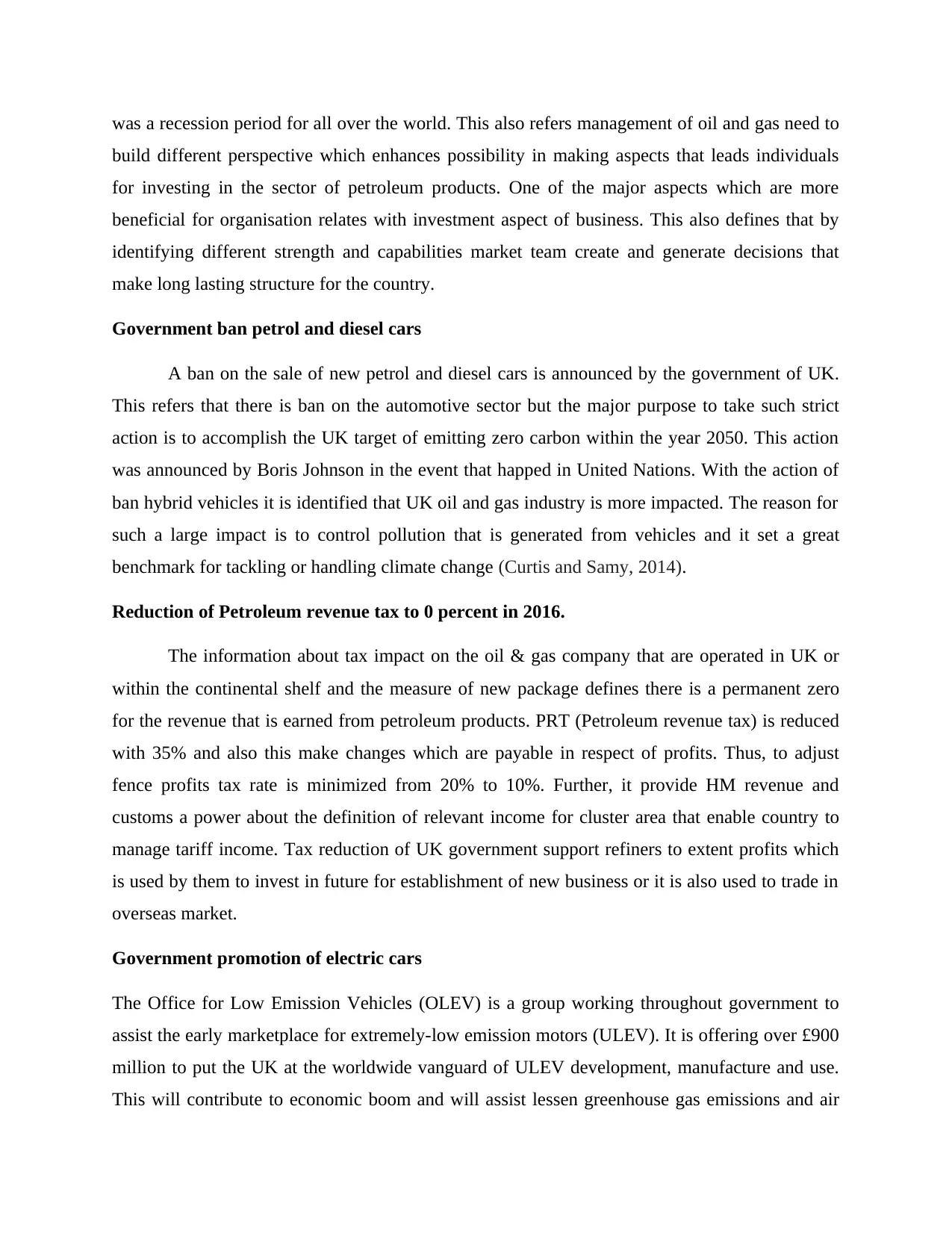
was a recession period for all over the world. This also refers management of oil and gas need to
build different perspective which enhances possibility in making aspects that leads individuals
for investing in the sector of petroleum products. One of the major aspects which are more
beneficial for organisation relates with investment aspect of business. This also defines that by
identifying different strength and capabilities market team create and generate decisions that
make long lasting structure for the country.
Government ban petrol and diesel cars
A ban on the sale of new petrol and diesel cars is announced by the government of UK.
This refers that there is ban on the automotive sector but the major purpose to take such strict
action is to accomplish the UK target of emitting zero carbon within the year 2050. This action
was announced by Boris Johnson in the event that happed in United Nations. With the action of
ban hybrid vehicles it is identified that UK oil and gas industry is more impacted. The reason for
such a large impact is to control pollution that is generated from vehicles and it set a great
benchmark for tackling or handling climate change (Curtis and Samy, 2014).
Reduction of Petroleum revenue tax to 0 percent in 2016.
The information about tax impact on the oil & gas company that are operated in UK or
within the continental shelf and the measure of new package defines there is a permanent zero
for the revenue that is earned from petroleum products. PRT (Petroleum revenue tax) is reduced
with 35% and also this make changes which are payable in respect of profits. Thus, to adjust
fence profits tax rate is minimized from 20% to 10%. Further, it provide HM revenue and
customs a power about the definition of relevant income for cluster area that enable country to
manage tariff income. Tax reduction of UK government support refiners to extent profits which
is used by them to invest in future for establishment of new business or it is also used to trade in
overseas market.
Government promotion of electric cars
The Office for Low Emission Vehicles (OLEV) is a group working throughout government to
assist the early marketplace for extremely-low emission motors (ULEV). It is offering over £900
million to put the UK at the worldwide vanguard of ULEV development, manufacture and use.
This will contribute to economic boom and will assist lessen greenhouse gas emissions and air
build different perspective which enhances possibility in making aspects that leads individuals
for investing in the sector of petroleum products. One of the major aspects which are more
beneficial for organisation relates with investment aspect of business. This also defines that by
identifying different strength and capabilities market team create and generate decisions that
make long lasting structure for the country.
Government ban petrol and diesel cars
A ban on the sale of new petrol and diesel cars is announced by the government of UK.
This refers that there is ban on the automotive sector but the major purpose to take such strict
action is to accomplish the UK target of emitting zero carbon within the year 2050. This action
was announced by Boris Johnson in the event that happed in United Nations. With the action of
ban hybrid vehicles it is identified that UK oil and gas industry is more impacted. The reason for
such a large impact is to control pollution that is generated from vehicles and it set a great
benchmark for tackling or handling climate change (Curtis and Samy, 2014).
Reduction of Petroleum revenue tax to 0 percent in 2016.
The information about tax impact on the oil & gas company that are operated in UK or
within the continental shelf and the measure of new package defines there is a permanent zero
for the revenue that is earned from petroleum products. PRT (Petroleum revenue tax) is reduced
with 35% and also this make changes which are payable in respect of profits. Thus, to adjust
fence profits tax rate is minimized from 20% to 10%. Further, it provide HM revenue and
customs a power about the definition of relevant income for cluster area that enable country to
manage tariff income. Tax reduction of UK government support refiners to extent profits which
is used by them to invest in future for establishment of new business or it is also used to trade in
overseas market.
Government promotion of electric cars
The Office for Low Emission Vehicles (OLEV) is a group working throughout government to
assist the early marketplace for extremely-low emission motors (ULEV). It is offering over £900
million to put the UK at the worldwide vanguard of ULEV development, manufacture and use.
This will contribute to economic boom and will assist lessen greenhouse gas emissions and air
Paraphrase This Document
Need a fresh take? Get an instant paraphrase of this document with our AI Paraphraser
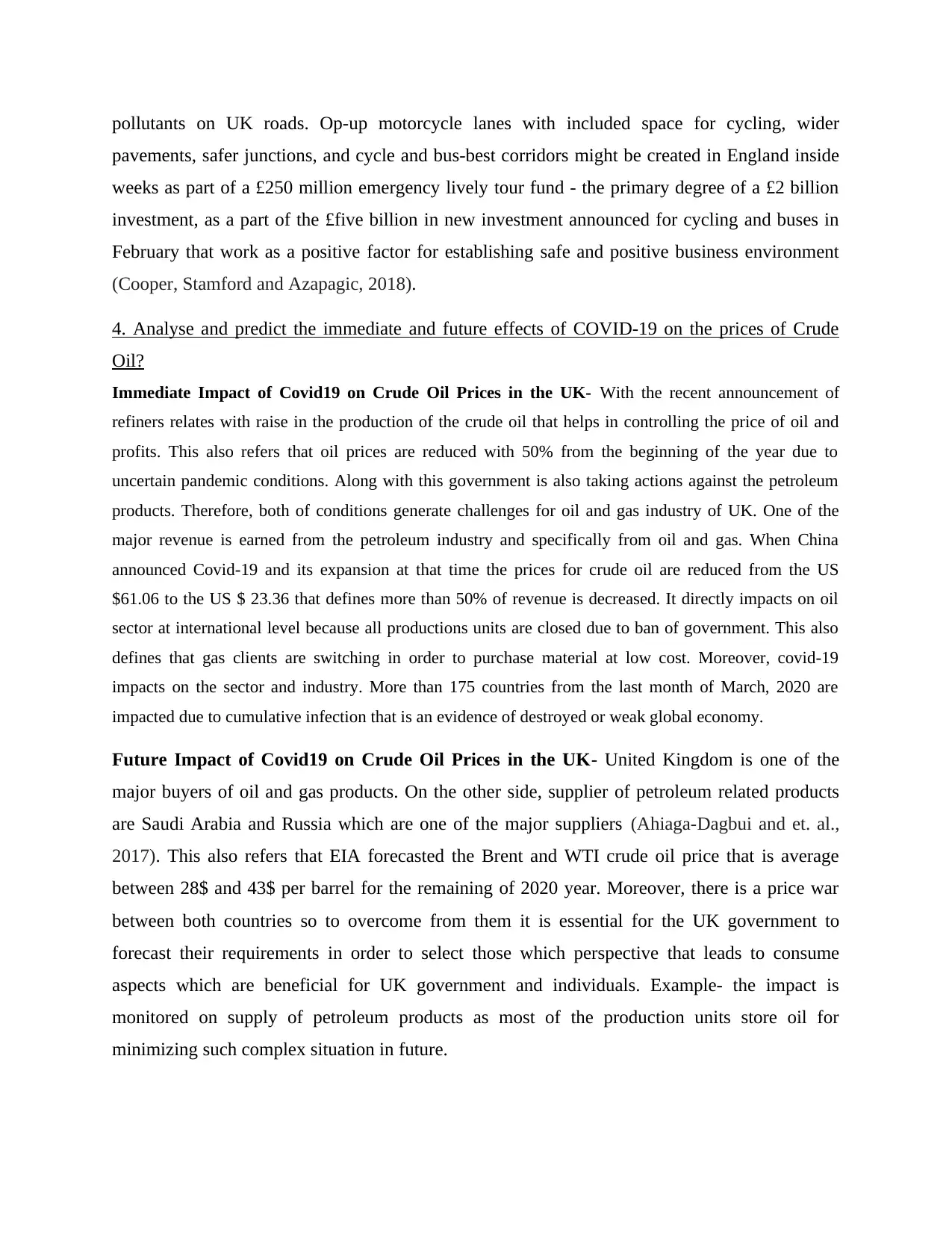
pollutants on UK roads. Op-up motorcycle lanes with included space for cycling, wider
pavements, safer junctions, and cycle and bus-best corridors might be created in England inside
weeks as part of a £250 million emergency lively tour fund - the primary degree of a £2 billion
investment, as a part of the £five billion in new investment announced for cycling and buses in
February that work as a positive factor for establishing safe and positive business environment
(Cooper, Stamford and Azapagic, 2018).
4. Analyse and predict the immediate and future effects of COVID-19 on the prices of Crude
Oil?
Immediate Impact of Covid19 on Crude Oil Prices in the UK- With the recent announcement of
refiners relates with raise in the production of the crude oil that helps in controlling the price of oil and
profits. This also refers that oil prices are reduced with 50% from the beginning of the year due to
uncertain pandemic conditions. Along with this government is also taking actions against the petroleum
products. Therefore, both of conditions generate challenges for oil and gas industry of UK. One of the
major revenue is earned from the petroleum industry and specifically from oil and gas. When China
announced Covid-19 and its expansion at that time the prices for crude oil are reduced from the US
$61.06 to the US $ 23.36 that defines more than 50% of revenue is decreased. It directly impacts on oil
sector at international level because all productions units are closed due to ban of government. This also
defines that gas clients are switching in order to purchase material at low cost. Moreover, covid-19
impacts on the sector and industry. More than 175 countries from the last month of March, 2020 are
impacted due to cumulative infection that is an evidence of destroyed or weak global economy.
Future Impact of Covid19 on Crude Oil Prices in the UK- United Kingdom is one of the
major buyers of oil and gas products. On the other side, supplier of petroleum related products
are Saudi Arabia and Russia which are one of the major suppliers (Ahiaga-Dagbui and et. al.,
2017). This also refers that EIA forecasted the Brent and WTI crude oil price that is average
between 28$ and 43$ per barrel for the remaining of 2020 year. Moreover, there is a price war
between both countries so to overcome from them it is essential for the UK government to
forecast their requirements in order to select those which perspective that leads to consume
aspects which are beneficial for UK government and individuals. Example- the impact is
monitored on supply of petroleum products as most of the production units store oil for
minimizing such complex situation in future.
pavements, safer junctions, and cycle and bus-best corridors might be created in England inside
weeks as part of a £250 million emergency lively tour fund - the primary degree of a £2 billion
investment, as a part of the £five billion in new investment announced for cycling and buses in
February that work as a positive factor for establishing safe and positive business environment
(Cooper, Stamford and Azapagic, 2018).
4. Analyse and predict the immediate and future effects of COVID-19 on the prices of Crude
Oil?
Immediate Impact of Covid19 on Crude Oil Prices in the UK- With the recent announcement of
refiners relates with raise in the production of the crude oil that helps in controlling the price of oil and
profits. This also refers that oil prices are reduced with 50% from the beginning of the year due to
uncertain pandemic conditions. Along with this government is also taking actions against the petroleum
products. Therefore, both of conditions generate challenges for oil and gas industry of UK. One of the
major revenue is earned from the petroleum industry and specifically from oil and gas. When China
announced Covid-19 and its expansion at that time the prices for crude oil are reduced from the US
$61.06 to the US $ 23.36 that defines more than 50% of revenue is decreased. It directly impacts on oil
sector at international level because all productions units are closed due to ban of government. This also
defines that gas clients are switching in order to purchase material at low cost. Moreover, covid-19
impacts on the sector and industry. More than 175 countries from the last month of March, 2020 are
impacted due to cumulative infection that is an evidence of destroyed or weak global economy.
Future Impact of Covid19 on Crude Oil Prices in the UK- United Kingdom is one of the
major buyers of oil and gas products. On the other side, supplier of petroleum related products
are Saudi Arabia and Russia which are one of the major suppliers (Ahiaga-Dagbui and et. al.,
2017). This also refers that EIA forecasted the Brent and WTI crude oil price that is average
between 28$ and 43$ per barrel for the remaining of 2020 year. Moreover, there is a price war
between both countries so to overcome from them it is essential for the UK government to
forecast their requirements in order to select those which perspective that leads to consume
aspects which are beneficial for UK government and individuals. Example- the impact is
monitored on supply of petroleum products as most of the production units store oil for
minimizing such complex situation in future.
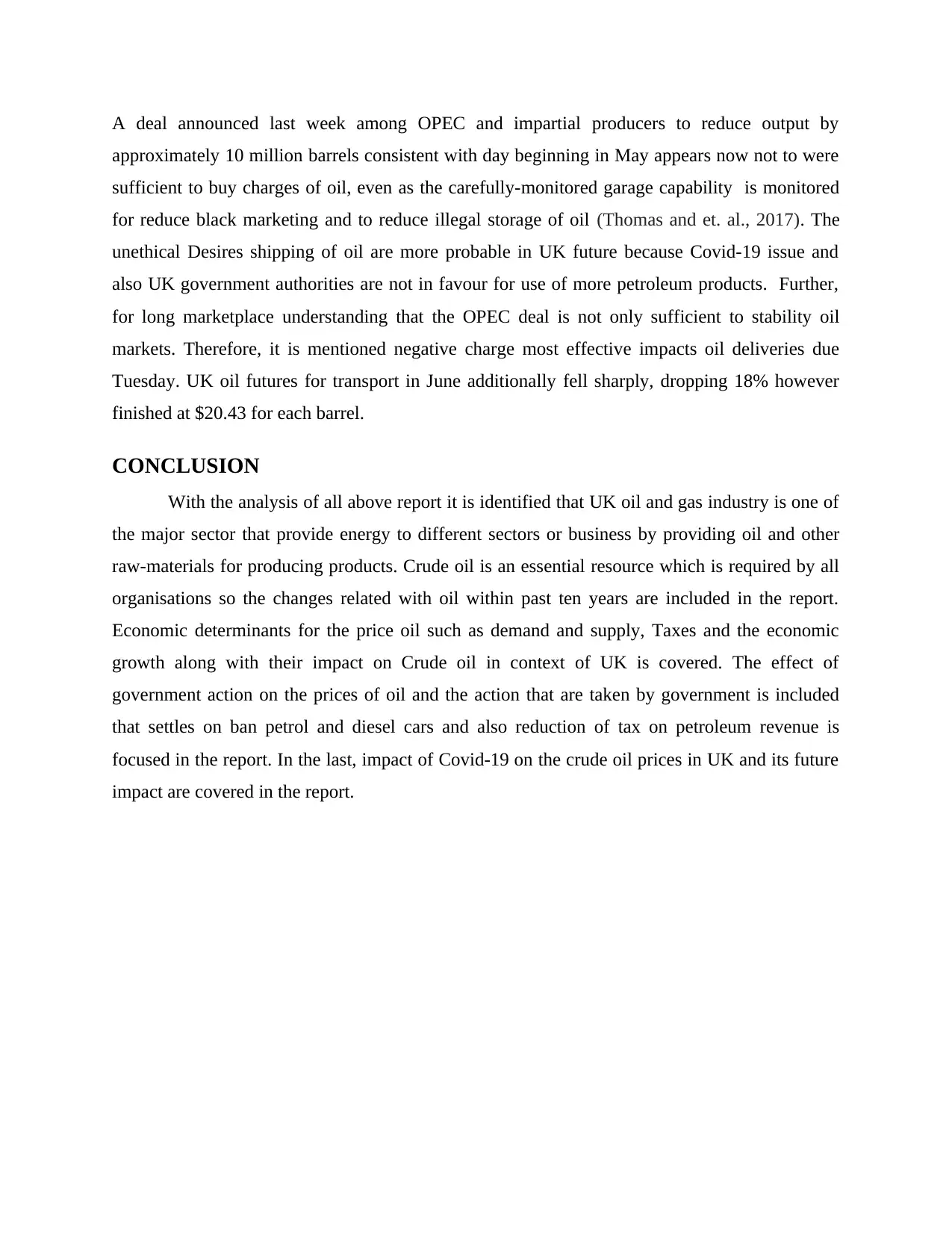
A deal announced last week among OPEC and impartial producers to reduce output by
approximately 10 million barrels consistent with day beginning in May appears now not to were
sufficient to buy charges of oil, even as the carefully-monitored garage capability is monitored
for reduce black marketing and to reduce illegal storage of oil (Thomas and et. al., 2017). The
unethical Desires shipping of oil are more probable in UK future because Covid-19 issue and
also UK government authorities are not in favour for use of more petroleum products. Further,
for long marketplace understanding that the OPEC deal is not only sufficient to stability oil
markets. Therefore, it is mentioned negative charge most effective impacts oil deliveries due
Tuesday. UK oil futures for transport in June additionally fell sharply, dropping 18% however
finished at $20.43 for each barrel.
CONCLUSION
With the analysis of all above report it is identified that UK oil and gas industry is one of
the major sector that provide energy to different sectors or business by providing oil and other
raw-materials for producing products. Crude oil is an essential resource which is required by all
organisations so the changes related with oil within past ten years are included in the report.
Economic determinants for the price oil such as demand and supply, Taxes and the economic
growth along with their impact on Crude oil in context of UK is covered. The effect of
government action on the prices of oil and the action that are taken by government is included
that settles on ban petrol and diesel cars and also reduction of tax on petroleum revenue is
focused in the report. In the last, impact of Covid-19 on the crude oil prices in UK and its future
impact are covered in the report.
approximately 10 million barrels consistent with day beginning in May appears now not to were
sufficient to buy charges of oil, even as the carefully-monitored garage capability is monitored
for reduce black marketing and to reduce illegal storage of oil (Thomas and et. al., 2017). The
unethical Desires shipping of oil are more probable in UK future because Covid-19 issue and
also UK government authorities are not in favour for use of more petroleum products. Further,
for long marketplace understanding that the OPEC deal is not only sufficient to stability oil
markets. Therefore, it is mentioned negative charge most effective impacts oil deliveries due
Tuesday. UK oil futures for transport in June additionally fell sharply, dropping 18% however
finished at $20.43 for each barrel.
CONCLUSION
With the analysis of all above report it is identified that UK oil and gas industry is one of
the major sector that provide energy to different sectors or business by providing oil and other
raw-materials for producing products. Crude oil is an essential resource which is required by all
organisations so the changes related with oil within past ten years are included in the report.
Economic determinants for the price oil such as demand and supply, Taxes and the economic
growth along with their impact on Crude oil in context of UK is covered. The effect of
government action on the prices of oil and the action that are taken by government is included
that settles on ban petrol and diesel cars and also reduction of tax on petroleum revenue is
focused in the report. In the last, impact of Covid-19 on the crude oil prices in UK and its future
impact are covered in the report.
⊘ This is a preview!⊘
Do you want full access?
Subscribe today to unlock all pages.

Trusted by 1+ million students worldwide
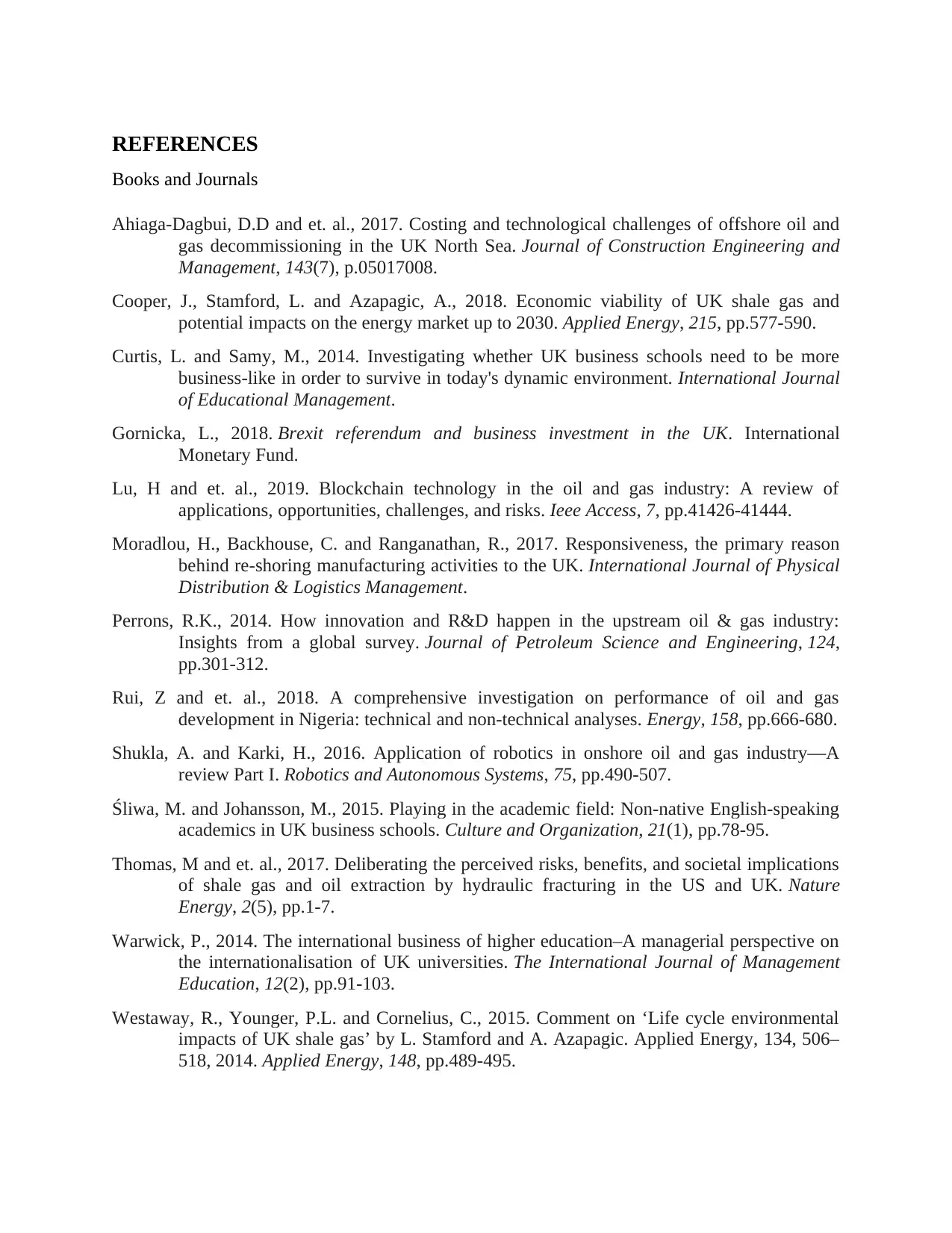
REFERENCES
Books and Journals
Ahiaga-Dagbui, D.D and et. al., 2017. Costing and technological challenges of offshore oil and
gas decommissioning in the UK North Sea. Journal of Construction Engineering and
Management, 143(7), p.05017008.
Cooper, J., Stamford, L. and Azapagic, A., 2018. Economic viability of UK shale gas and
potential impacts on the energy market up to 2030. Applied Energy, 215, pp.577-590.
Curtis, L. and Samy, M., 2014. Investigating whether UK business schools need to be more
business-like in order to survive in today's dynamic environment. International Journal
of Educational Management.
Gornicka, L., 2018. Brexit referendum and business investment in the UK. International
Monetary Fund.
Lu, H and et. al., 2019. Blockchain technology in the oil and gas industry: A review of
applications, opportunities, challenges, and risks. Ieee Access, 7, pp.41426-41444.
Moradlou, H., Backhouse, C. and Ranganathan, R., 2017. Responsiveness, the primary reason
behind re-shoring manufacturing activities to the UK. International Journal of Physical
Distribution & Logistics Management.
Perrons, R.K., 2014. How innovation and R&D happen in the upstream oil & gas industry:
Insights from a global survey. Journal of Petroleum Science and Engineering, 124,
pp.301-312.
Rui, Z and et. al., 2018. A comprehensive investigation on performance of oil and gas
development in Nigeria: technical and non-technical analyses. Energy, 158, pp.666-680.
Shukla, A. and Karki, H., 2016. Application of robotics in onshore oil and gas industry—A
review Part I. Robotics and Autonomous Systems, 75, pp.490-507.
Śliwa, M. and Johansson, M., 2015. Playing in the academic field: Non-native English-speaking
academics in UK business schools. Culture and Organization, 21(1), pp.78-95.
Thomas, M and et. al., 2017. Deliberating the perceived risks, benefits, and societal implications
of shale gas and oil extraction by hydraulic fracturing in the US and UK. Nature
Energy, 2(5), pp.1-7.
Warwick, P., 2014. The international business of higher education–A managerial perspective on
the internationalisation of UK universities. The International Journal of Management
Education, 12(2), pp.91-103.
Westaway, R., Younger, P.L. and Cornelius, C., 2015. Comment on ‘Life cycle environmental
impacts of UK shale gas’ by L. Stamford and A. Azapagic. Applied Energy, 134, 506–
518, 2014. Applied Energy, 148, pp.489-495.
Books and Journals
Ahiaga-Dagbui, D.D and et. al., 2017. Costing and technological challenges of offshore oil and
gas decommissioning in the UK North Sea. Journal of Construction Engineering and
Management, 143(7), p.05017008.
Cooper, J., Stamford, L. and Azapagic, A., 2018. Economic viability of UK shale gas and
potential impacts on the energy market up to 2030. Applied Energy, 215, pp.577-590.
Curtis, L. and Samy, M., 2014. Investigating whether UK business schools need to be more
business-like in order to survive in today's dynamic environment. International Journal
of Educational Management.
Gornicka, L., 2018. Brexit referendum and business investment in the UK. International
Monetary Fund.
Lu, H and et. al., 2019. Blockchain technology in the oil and gas industry: A review of
applications, opportunities, challenges, and risks. Ieee Access, 7, pp.41426-41444.
Moradlou, H., Backhouse, C. and Ranganathan, R., 2017. Responsiveness, the primary reason
behind re-shoring manufacturing activities to the UK. International Journal of Physical
Distribution & Logistics Management.
Perrons, R.K., 2014. How innovation and R&D happen in the upstream oil & gas industry:
Insights from a global survey. Journal of Petroleum Science and Engineering, 124,
pp.301-312.
Rui, Z and et. al., 2018. A comprehensive investigation on performance of oil and gas
development in Nigeria: technical and non-technical analyses. Energy, 158, pp.666-680.
Shukla, A. and Karki, H., 2016. Application of robotics in onshore oil and gas industry—A
review Part I. Robotics and Autonomous Systems, 75, pp.490-507.
Śliwa, M. and Johansson, M., 2015. Playing in the academic field: Non-native English-speaking
academics in UK business schools. Culture and Organization, 21(1), pp.78-95.
Thomas, M and et. al., 2017. Deliberating the perceived risks, benefits, and societal implications
of shale gas and oil extraction by hydraulic fracturing in the US and UK. Nature
Energy, 2(5), pp.1-7.
Warwick, P., 2014. The international business of higher education–A managerial perspective on
the internationalisation of UK universities. The International Journal of Management
Education, 12(2), pp.91-103.
Westaway, R., Younger, P.L. and Cornelius, C., 2015. Comment on ‘Life cycle environmental
impacts of UK shale gas’ by L. Stamford and A. Azapagic. Applied Energy, 134, 506–
518, 2014. Applied Energy, 148, pp.489-495.
Paraphrase This Document
Need a fresh take? Get an instant paraphrase of this document with our AI Paraphraser

Williams, D.A., 2016. Can neural networks predict business failure? Evidence from small high
tech firms in the UK. Journal of Developmental Entrepreneurship, 21(01), p.1650005.
Witt, K., Whitton, J. and Rifkin, W., 2018. Is the gas industry a good neighbour? A comparison
of UK and Australia experiences in terms of procedural fairness and distributive
justice. The Extractive Industries and Society, 5(4), pp.547-556.
tech firms in the UK. Journal of Developmental Entrepreneurship, 21(01), p.1650005.
Witt, K., Whitton, J. and Rifkin, W., 2018. Is the gas industry a good neighbour? A comparison
of UK and Australia experiences in terms of procedural fairness and distributive
justice. The Extractive Industries and Society, 5(4), pp.547-556.
1 out of 11